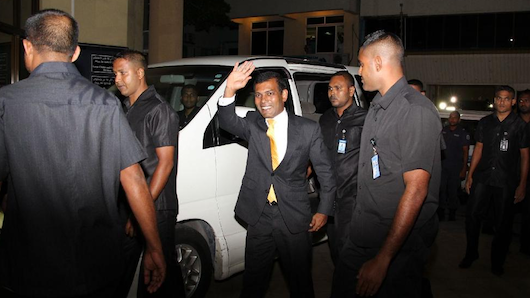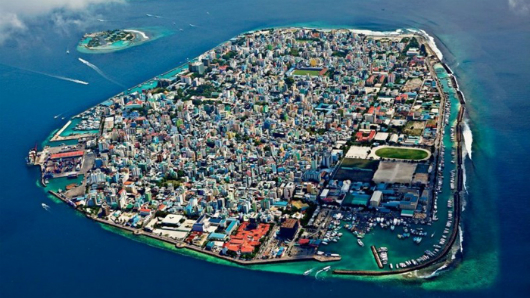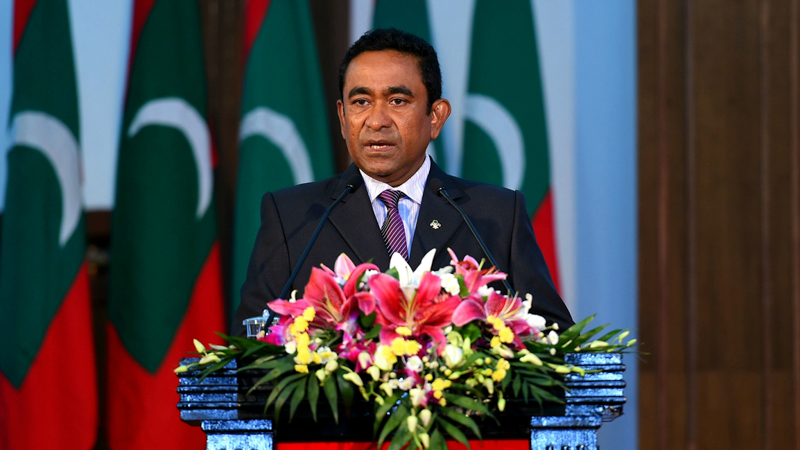Letters from the government to stakeholders in India as well as the UN High Commissioner for Human Rights concerning the trial and conviction of former President Mohamed Nasheed contains several demonstrably false claims.
An open letter dated March 19 – sent from the Maldives High Commission in India to major political actors – along with a letter from Foreign Minister Dunya Maumoon to the UN High Commissioner for Human Rights were recently leaked online and reported on by local media.
A ‘Timeline of key events in the trial’ in the letter to Indian stakeholders read: “On 23 February 2015, former President Nasheed was given the opportunity to appoint legal counsel, when he was presented before the judge of the Criminal Court for a procedural remand hearing in relation to the amended and re-filed charges.”
“His legal team was not present at this hearing because they had failed to register themselves as per Criminal Court regulations.”
The claim is false as Nasheed was arrested around 2:30pm on February 22 and brought to the Criminal Court for the first hearing of the terrorism trial at 4:00pm the next day, where charges were read out and he was given three days to appoint lawyers.
Nasheed’s lawyers held a press conference at noon on February 23, announcing they were unable to represent the opposition leader, as the Criminal Court had told them they should have registered two days in advance despite being unaware of the trial until the opposition leader’s arrest the previous day.
Moreover, while remand hearings take place within 24 hours of an arrest, Nasheed was brought to court after the 24-hour period lapsed.
At the same hearing, judges ruled Nasheed be held in a location determined by the Home Ministry until the end of the trial. He was subsequently held in police custody at the Dhoonidhoo Island Detention Center.
The High Commission’s letter also justified Criminal Court’s refusal to grant adequate time to prepare for defence stating the court “determined that all the relevant documents relevant for the defence had been issued as far back as mid-2012, and that no new evidence was being put forward by the state prosecutors.”
But Nasheed’s defence team quit half-way through the trial after they were unable to view documentary evidence submitted by the state as some evidence CDs were left blank or were dysfunctional.
“The court repeatedly reminded former President Nasheed to engage legal counsel or the bench would consider that he waived his right to counsel, but advised former President Nasheed that he could engage counsel at any time,” the High Commission’s letter stated.
However, in subsequent hearings, the court refused Nasheed’s repeated request for between ten and 15 days to appoint new counsel and concluded proceedings four days later.
“Rushed process”
Meanwhile, a letter from Foreign Minister Dunya Maumoon to UN High Commissioner for Human Rights Zeid Ra’ad Al Hussein was also leaked online.
In a statement on March 18, the UN human rights chief said Nasheed was convicted after “a rushed process that appears to contravene the Maldives’ own laws and practices and international fair trial standards in a number of respects.”
Asserting the independence of the Prosecutor General and judiciary, Dunya insisted that criminal proceedings against Nasheed were fair, transparent and in accordance with the Constitution.
“I can therefore assure Your Excellency that the independence of the judiciary and the fairness of due legal process remain as sacrosanct in the case against [Nasheed] as they would for any other Maldivian citizen,” the letter stated.
“I can also further assure Your Excellency that the government of Maldives will continue to ensure the inviolability of a citizen’s right to a fair trial, insulated from political interference.”
Dunya also falsely claimed that Nasheed was presented before the Criminal Court on February 23 for a remand hearing.
“His legal team was not present at this hearing because none of them had registered their right of audience for the case,” the letter stated.
While the High Commissioner stated that Nasheed was “constrained from calling witnesses” and noted a conflict of interest as “judges in the case as well as the Prosecutor General were witnesses in the investigation,” Dunya claimed both points were “indeed incorrect.”
Dunya said Nasheed had called two of the presiding judges and the PG as witnesses for the defence.
“Mr Nasheed’s request was naturally overruled by the bench on the basis that these officials could not be called as witnesses on evidentiary rules of relevancy and probative value,” the letter stated.
The PG, and two of the three presiding judges were at Judge Abdulla’s home at the time of his arrest and had testified in a 2012 Human Rights Commission of the Maldives investigation. The PG’s case is built on the HRCM investigation.
Conspiracy
The government meanwhile denied a “conspiracy to unwarrantedly convict” Nasheed to prevent the opposition leader from contesting the 2018 presidential election.
In the open letter to stakeholders in India, the government also assured that Nasheed was “afforded a free and fair trial in full accordance with the Constitution and laws” contrary to “speculation and misrepresentation of facts” by the opposition Maldivian Democratic Party (MDP).
It suggested that Nasheed’s participation in the 2013 presidential election “amply proves there are no conspiracy theories to eliminate him from the political arena.”
The administration of President Abdulla Yameen could “neither interfere nor influence” any decision by the independent Prosecutor General or the judiciary, it added.
“The independence of the judiciary and the fairness of due legal process have been as sacrosanct in the case against former President Nasheed as they would have been for any other Maldivian citizen. The Maldives government will continue to ensure the inviolability of a citizen’s right to a fair trial, insulated from political interference,” reads the letter.




